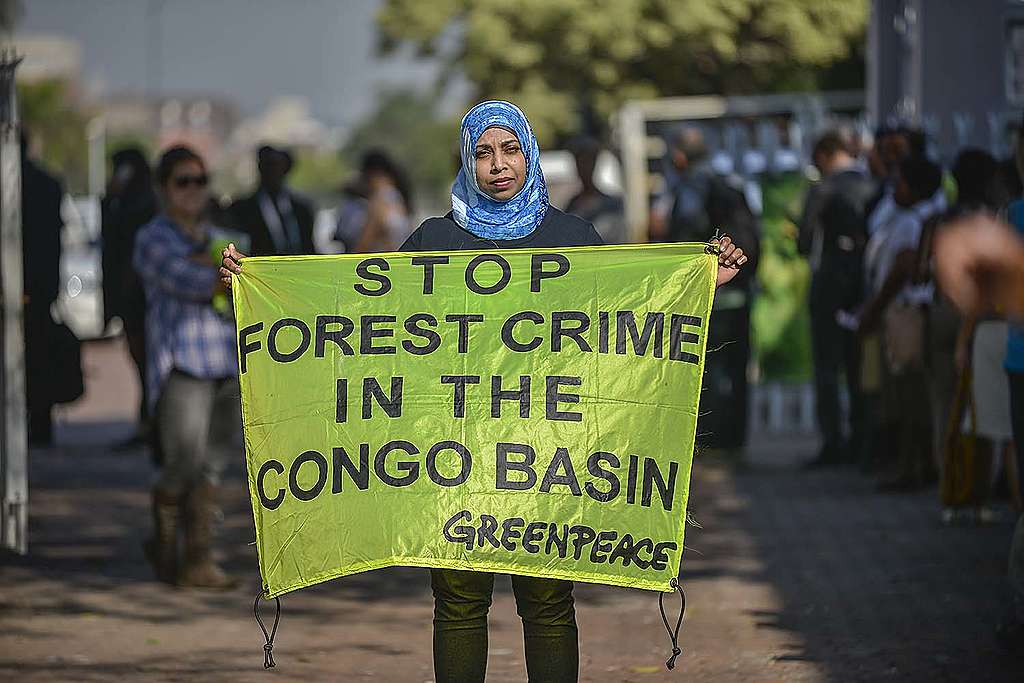
The DRC government is auctioning off 30 oil and gas blocks in the Cuvette-Centrale Peatlands in the Congo Basin forest — the world’s largest tropical peatland. Peatland soils are known as ‘carbon sinks’ because packed into them are immense stores of carbon that get released into the atmosphere when the ecosystem is disturbed.
For context, The Congo Rainforest is second only to the Amazon Rainforest in terms of its importance as a carbon sink. It contains the largest tropical peatlands in the world. These areas store around thirty billion tons of carbon.
Exploiting these lands for oil through this DRC land auction risks not only eliminating an essential tool for absorbing carbon emissions, but also risks the drying up of the peat and releasing already stored carbon into the atmosphere. A situation that would be catastrophic to the continent, as these rainforests and peatlands are responsible for a huge percentage of the regulation of Africa’s climate.
But first, a little background into the Congo Basin…

The Congo basin covers 530 million hectares (1.3 billion acres) in central Africa and represents 70% of the continent’s forested land. It hosts over a thousand bird species and more primates than any other place worldwide, including the great apes: gorillas, chimpanzees and Bonobos.
Local communities have lived in the Congo Basin for more than 50,000 years. Today, 75 million people from over 150 distinct ethnic groups depend on the health of the forest that covers much of the Congo Basin peatland complex.
Known as the Cuvette Centrale, this complex is the size of the whole country of Ghana and straddles the Democratic Republic of the Congo and the Republic of the Congo.
The DRC (the country participating in this land auction to big oil) represents 60 per cent of the Congo basin which makes it the second most important country in the tropics for peat areas and peat carbon stocks. The DRC is also home to the second-largest tropical forest in the world, the Congo rainforest, which represents 10% of the world’s tropical forests.
Overall, the DRC’s forests contain a total of 23.3 Gigaton of carbon (GtCO2e). Beyond that, it stores up to 30 Gigaton of carbon (GtCO2e) in peatlands in the Cuvette Centrale region equivalent to three years’ global emissions from fossil fuels.
What is at risk with this auctioning off of oil blocks in the DRC?
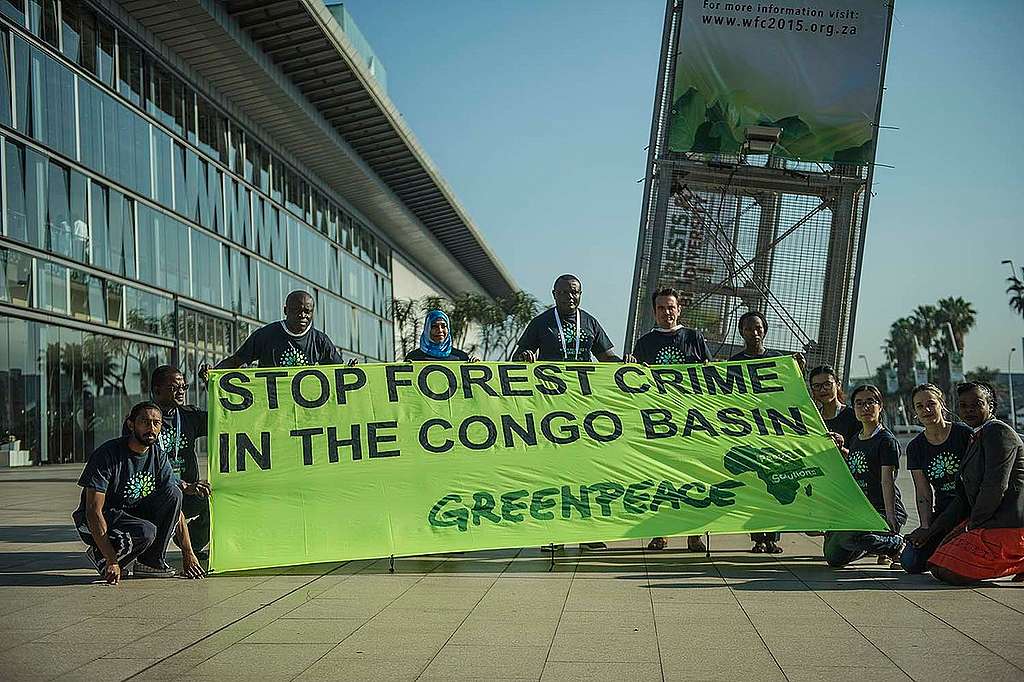
Brought together by UN Environment and other Global Peatlands Initiative partners, the Democratic Republic of the Congo, the Republic of the Congo and Indonesia signed the Brazzaville Declaration in March 2018 to protect this complex.
However, there is the risk of losing this biodiversity hotspot soon.
On July 28, the country’s government announced plans to auction 27 oil blocks and three gas blocks to the highest bidder.
The Central African Forest Initiative (CAFI), a group of donor countries, currently chaired by Germany, signed a Letter of Intent with the DRC government at the COP26 in November 2021. Welcomed by US President Joe Biden, the agreement not only foresaw a lifting of the 20-year ban on new logging concessions, but it also greenlit oil and gas activity across the country.
The $500 million Letter of Intent that CAFI signed with DRC at Glasgow on 2 November 2021 conspicuously lacks any clause banning oil activity either from forests, peatlands or even protected areas.
With the auction of these oil blocks, local communities will definitely be taken hostage by politico-economic elites. Congolese oil will mean the disappearance of immense parts of the biodiversity that 100 million people depend on for fishing, agriculture and other traditional practices.
The Congo Basin is also home to the Batwa and other local communities facing violence and discrimination. A group that will be displaced if these new oil fields are auctioned. The Congo Basin is also home to an estimated 3,000 species of animals, including the critically endangered Eastern Gorilla.
Inviting big oil to the Congo rainforest: What exactly is the auction about?
The more you think about it, the rainforests of the DRC might actually be one of the worst places in the world to drill for oil.
Simon Lewis, a professor at Leeds University and head of a British-Congolese research group called CongoPeat has warned there may not be substantial oil deposits beneath the Congo forests and if there are, getting them from extremely remote areas to global markets may not be economically viable.
Yet even if exploration reveals no commercial-scale oil fields, it will seriously damage the rainforest’s biodiversity.
A timeline of events that led us to this land auction to big oil
This all began on January 29th 2022 when the Congolese Minister of Hydrocarbons Rubens Mikindo made an Announcement about the forthcoming auction of nineteen new oil blocks across the Democratic Republic of Congo.
From the beginning, we have called on the Government of the DRC to cancel the auctioning off of these oil blocks. DRC committed to becoming a “country-solution” to climate change, a position defended by the official Congolese delegation to COP 26 in Glasgow, their signing off of auctioning rights to big oil goes against this.
In June 2022, we later found out that nine of the 16 oil blocks to be auctioned in the Democratic Republic of Congo (DRC) overlap Protected Areas, including a national park, nature reserves, and a mangroves marine park.
Despite the government’s reassurances that none of these zones are in environmentally sensitive zones, our analysis has shown that three of these overlap peatlands and at least 13 overlap protected areas, including Virunga National Park, a UNESCO World Heritage Site (home to the last bastion of mountain gorillas) that’s threatened by armed conflicts and now by the prospects of drilling.
Minister Didier Budimbu, who had previously insisted that “none” of the blocks overlaps Protected Areas, confirmed Greenpeace’s findings in this video provided by DRC’s hydrocarbons ministry.
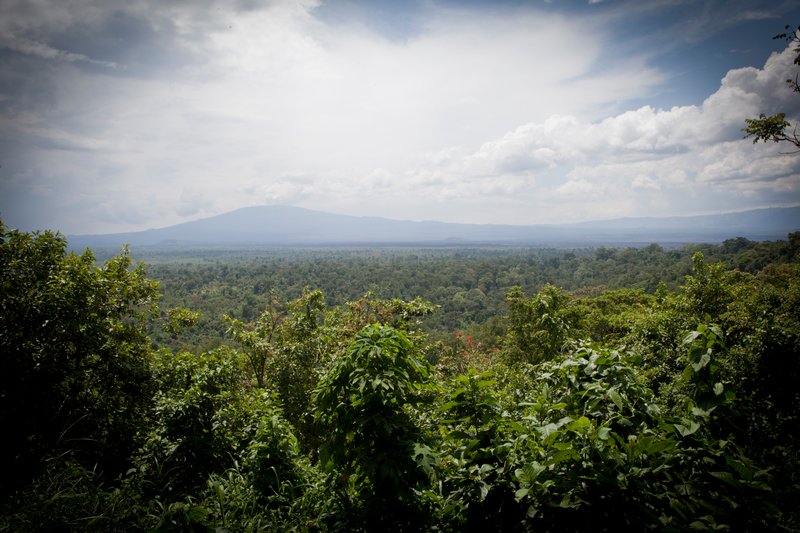
On 18 July 2022 – 10 days before the launch of the auction – the Hydrocarbons Minister declared that the number of blocks on offer had increased from the 16 announced in April 2022 to 27 oil blocks. In addition to the 27 oil blocks, the rights to extract methane gas from three blocks in Lake Kivu were also announced to be up for auction.
At his announcement in Kinshasa, he said that this tendering process of the oil blocks is a solution to the challenges of the development of the Hydrocarbons sector in the DRC in all aspects – already a problematic statement on its own.
This is because now is not the time to embark on new Fossil fuel projects. We are in the midst of a climate crisis that disproportionately affects African people. We should be ramping up investments in renewable energy and expanding plans for community-led forest management.
According to this New IPCC report all hands need to be on deck. From the report, it is clear how severe the impacts of climate change already are, causing widespread losses and damages to people and ecosystems around the world. This is projected to escalate with every bit of further warming, drilling for oil will make a bad situation even worse.
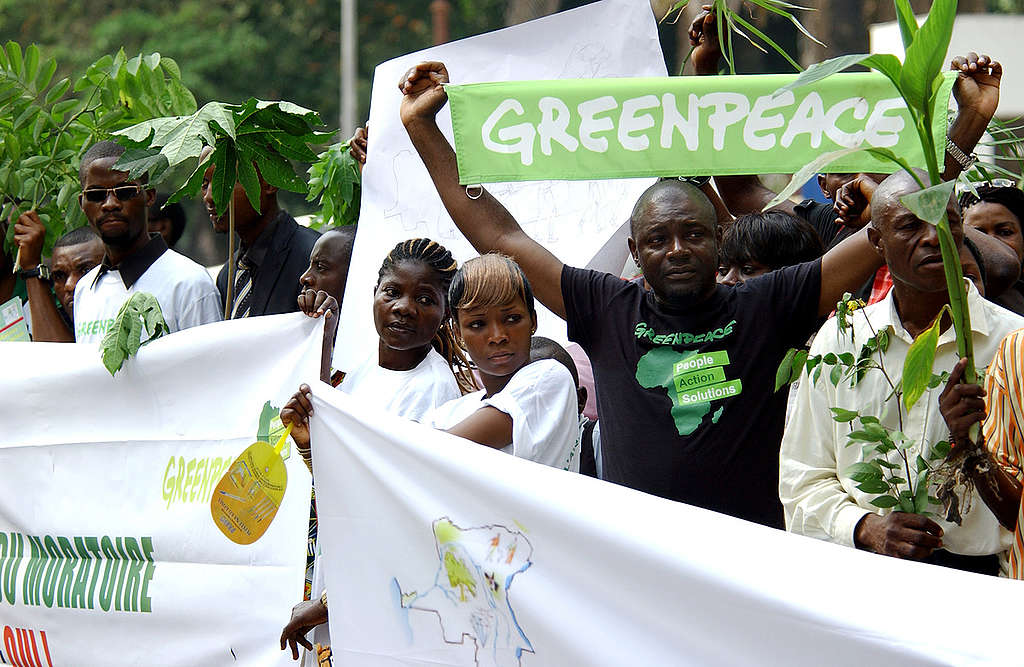
On 25th July 2022, more than 100,000 people signed a petition calling on President Félix Tshisekedi of the Democratic Republic of Congo (DRC) to end the development of new oil and gas fields in the country. The petition was launched in July 2022 by Congolese and international NGOs and was handed over on 25th July 2022 by Greenpeace Africa activists to the DRC Presidency.
2nd February 2023: Just last month, a coalition of civil society groups learned about a secret deal between Oil Minister Didier Budimbu, Nigerian gambling tycoon Chukwuma Ayodeji Ojuroye, and US consultancy GeoSigmoid.
The secret deal involved Ojuroye’s (the Nigerian tycoon) Emirati-registered firm Clayhall Group reserving two oil blocks in exchange for the pre-financing of geological surveys by GeoSigmoid. This was basically a separate tender away from the 27 oil blocks already up for auction
This in itself is catastrophic but what adds insult to injury is that Congo’s Oil Minister Mr. Budimbu’s promoted the auction in his global communications campaign as transparent, only for this to come out to the light.
In January 2023, the government had planned to announce which companies were bidding to drill for oil in the 27 areas of the DRC on Monday, January 30.
But, on the Saturday before the deadline, hydrocarbons minister Didier Budimbu tweeted that the cut-off points had been pushed back to various dates between April and October 2023.
We are not certain what exactly caused this push, but the combination of the global outcry of the environmental risks, human rights violations that this auction has already caused and will accuse down the road, regulatory uncertainty in the sector, the huge logistical challenges of highly remote exploration, and on top of it all Congo’s higher political risk premium, may likely be the reason.
Why are we opposed to gas and oil exploration in the Congo rainforest
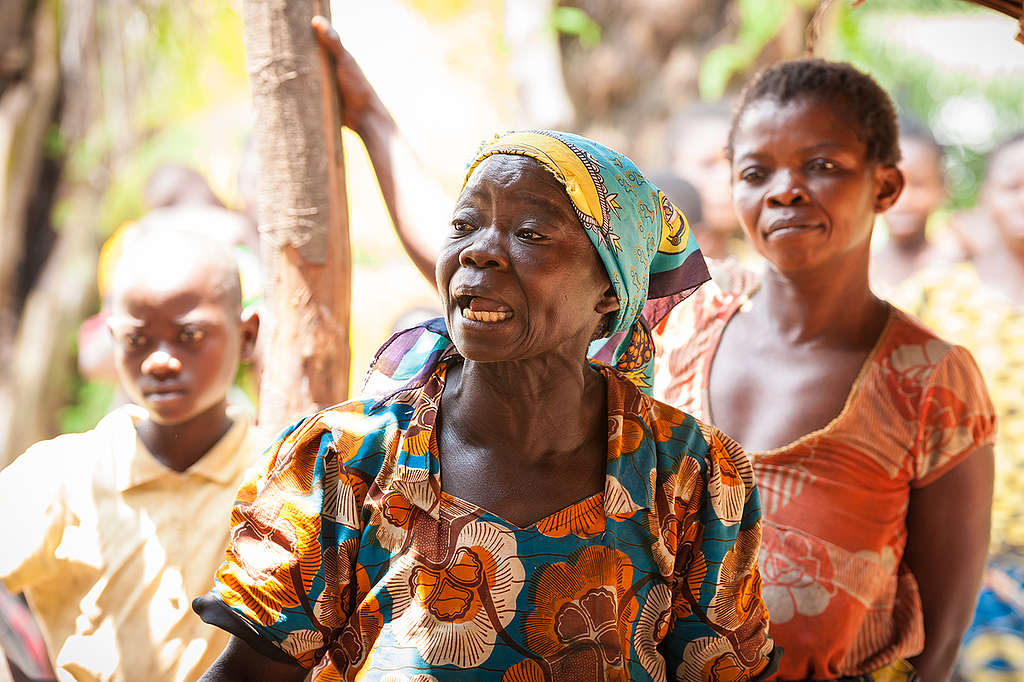
The oil and gas auction in the Congo will undoubtedly have devastating impacts on the ecosystem and the biodiversity of the peatlands. The government remains intentionally blind to this fact because it insists on framing this as a major way to advance its economy. With nationalist rhetoric, the DRC government constantly reiterates that its duty is to its people and not the environment.
This a misleading message because:
- This government which claims to have a duty to its people first did not consult with those living in this land, their ancestral land, the land in which they get their food and livelihood from, before the auction.
- If the government cared this auction would be halted with immediate effect as its success would mean displacement of millions of Congolese, a humanitarian disaster on its own.
It is an infringement of rights and dignity of the Congolese people
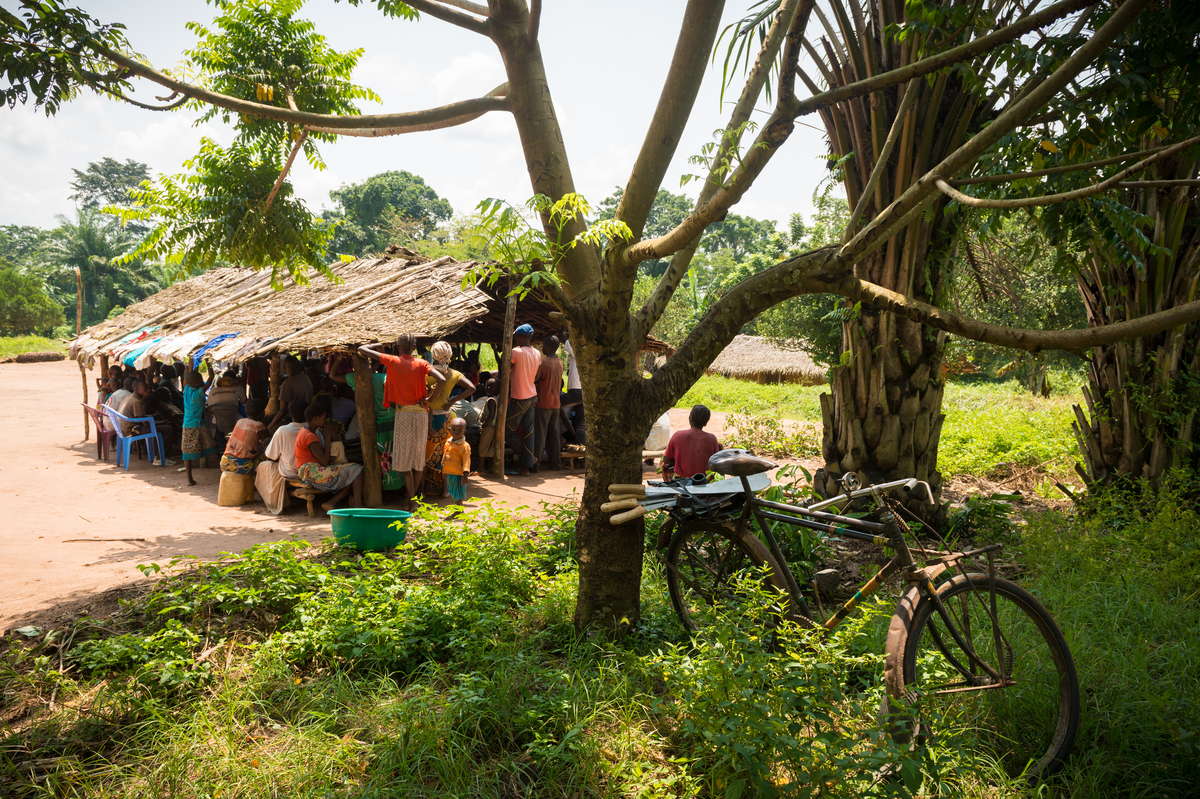
Exploration and drilling rights are being granted in ways that sacrifice natural ecosystems that have been serving local and Indigenous communities for centuries.
It’s important to note that this auction was initiated without consulting the communities that live in the land where this gas and oil exploration would take place.
You can imagine how dismissive that is to the local communities who live there. The consultation of the local community is a legal requirement.
The DRC’s 2011 Environment Law fixes for any project or activity that may have an impact on the environment ‘’a prior public inquiry’’. The purpose, in particular, is to inform the local community about the project or activity. The exercise also allows for the collecting of opposition to whatever project that they see does not fit into their way of life or projects which will adversely affect their health or livelihood.

Securing the land rights of local communities and Indigenous People, including through community forest management rights and the DRC’s new Indigenous Peoples law, so that they may control their own development should be a priority.
We believe that the rights of Congolese people are best served by intact forests, which serve millions of them.
Reeks of neocolonialism
As mentioned earlier, after the auction, there was a lot of nationalist rhetoric from the government meant to mislead us into thinking this land auction to big oil was for the good of the Congolese people.
However, we know it’s not. As is the case in most African countries that explore and drill for oil, we have seen firsthand that this infrastructure and operations just extract from African soil and do not benefit the people.
In fact, we can already see how it will play out as it is a script that has been written before. Richer nations, big multinationals and a closed circle of elites will profit while the majority of the population in the country will be displaced deepening their hardships.
This displacement first and foremost leads to indignity. We know that indecent work in these oil fields would replace their working on the land and their benefiting from the earth as it should be as stewards of the earth.
Recently there has been a scramble and partition almost by rich economies in Africa to explore for oil. We won the fight in South Africa to keep Shell from exploring for oil in the Wild Coast, and are now in a fight against DRC’s government to keep the pristine ecosystem of the Congo free from the same. You can help us by signing this petition
The cure to this neocolonialism is for African leaders to say no to foreign entities that come with solutions to problems they created. It is up to us as Africans to come up with new paths for development for the continent.
Building local industry for manufacturing to create jobs, providing decentralised energy access through tapping into the abundance of solar energy, conserving nature and investing in eco-tourism are some of the paths to development that Africa needs.
Disruption of Africa’s biggest carbon sink
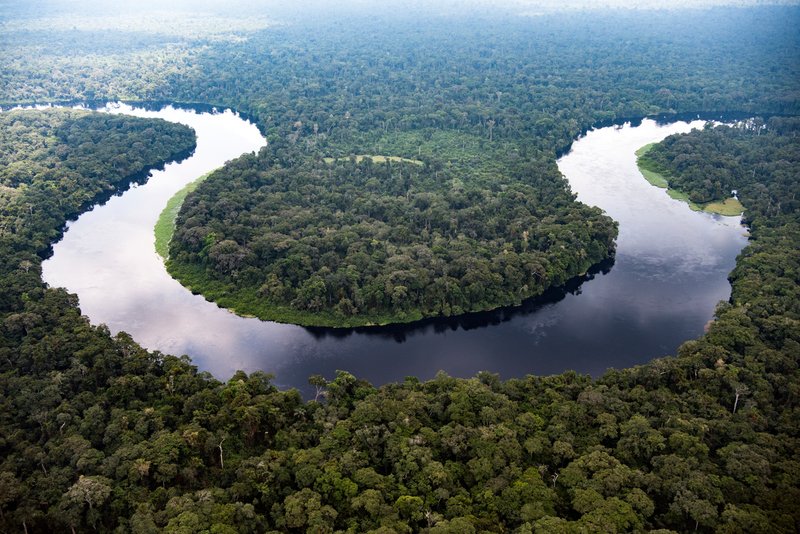
The Congo Basin ecosystem is an important carbon sink. It contains the largest tropical peatlands in the world and the second-largest rainforest in the world. Rainforests suck in a lot of carbon while peatlands store carbon emissions in the ground.
These areas are climate superheroes, storing around twenty-nine billion tons of carbon.
Peatlands do their job, they store vast amounts of carbon released from human activities, and degrading them would result in massive carbon emissions. Exploiting forested land for resource extraction also risks eliminating an essential tool for absorbing carbon emissions.
Will lead to the Degrading Congolese land and the disruption of their way of life
The DRC government’s decision to auction off land to big oil companies is not only a threat to Africa’s biggest carbon sink but also to the health, well-being, and livelihoods of millions of Congolese.
Oil exploration and drilling will have severe social and health impacts on local communities, including displacement, loss of livelihoods, and exposure to toxic chemicals. These impacts can lead to increased poverty, social unrest, and public health crises.
The government should instead prioritize sustainable development policies that protect the Congo Basin’s ecosystem services, support local communities, and promote climate resilience.
Will Further Deepen The Country’s Hardships
The Congo is known for its vast riches in natural resources which in another world, a better world, would have been a source of improvement of the material conditions of its people. However, years after independence it still ranks among the poorest nations in the world.
The government argues that this land auction to big oil will create jobs, boost economic growth, and reduce the country’s dependence on foreign aid. However, we believe that the sale of oil exploration rights in the rainforests and peatlands of the Democratic Republic of the Congo is not an act of nationalism but almost feels like selling off its people.
We have seen the scenes of horrific images of child labour and other hardship in its cobalt mines making global headlines. This oil exploration and later drilling we are afraid will repeat these same patterns.
Drilling will pose significant risks to a continent already inundated by harsh climate effects
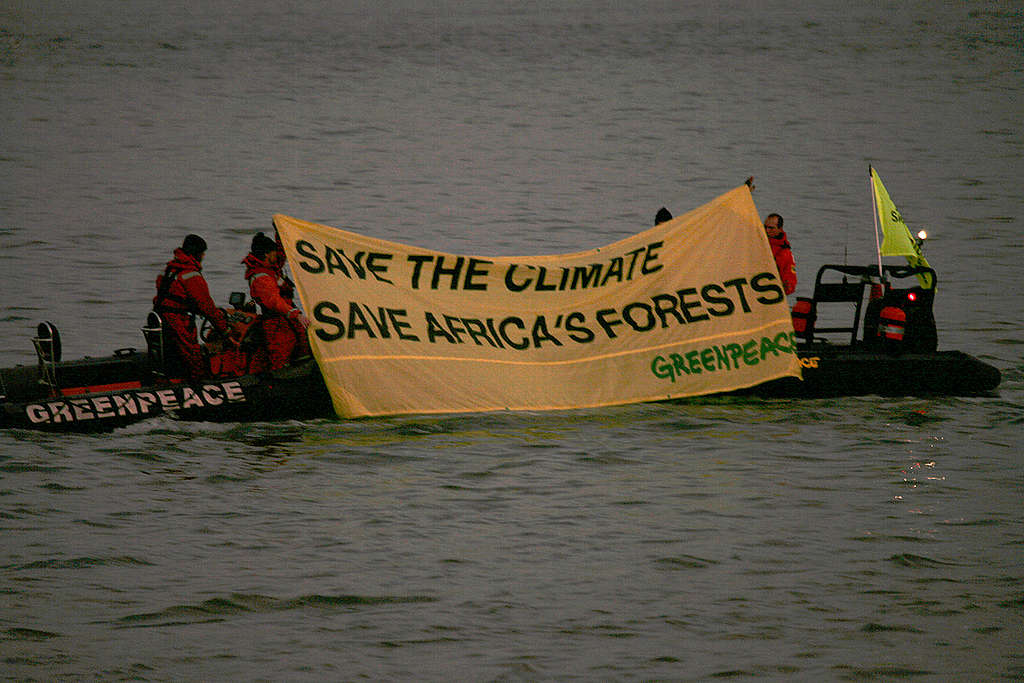
Africa is already at the forefront of the climate crisis. With environmental disasters affecting countries all over the continent. These catastrophes should be a sign to move away from fossil fuels as their extraction and burning contribute to climate change.
The Congo rainforest plays an important role in mitigating climate change by absorbing carbon dioxide from the atmosphere, and oil and gas exploration can release significant amounts of greenhouse gases into the atmosphere, further exacerbating the problem.
Importance of Congo rainforest: its peat lands and its rainforest
The forest provides crucial ecosystem services
These services include water regulation, soil conservation, and carbon sequestration. These are ecosystem services that are essential for human well-being and the health of the planet.
The forest plays a crucial role in regulating Africa’s climate, by absorbing carbon dioxide through photosynthesis and storing it in its biomass and soils. The Congo rainforest also helps to regulate water flows, preventing flooding and erosion and provides habitat for many species that contribute to biodiversity.
The forests of the Congo basin have also long been valued for their cultural and spiritual significance, providing inspiration for art, literature, and music. They also offer recreational opportunities, such as hiking, camping, and birdwatching.
The Congo Basin is a Biodiversity hotspot

The central Congo peatlands are the world’s largest tropical peatland complex, covering 16.8 million hectares. Two-thirds of this peatland, 11.3 million hectares, is in the DRC.
Of the Congo Basin’s extraordinary variety of tropical plants, 30 percent are unique to the region. Among the hundreds of species of mammals and fish and the thousand species of birds it hosts, many are endangered. Some of the auctioned blocks fall within Virunga National Park, a UN Educational, Scientific, and Cultural Organization (UNESCO) World Heritage site and home to some of the world’s last remaining mountain gorillas.
Impact of oil exploration and drilling on Congolese people
The Congo rainforest is one of the most biodiverse regions on the planet, and oil and gas exploration can have a devastating impact on the fragile ecosystems and the wildlife that depend on them.
Habitat fragmentation
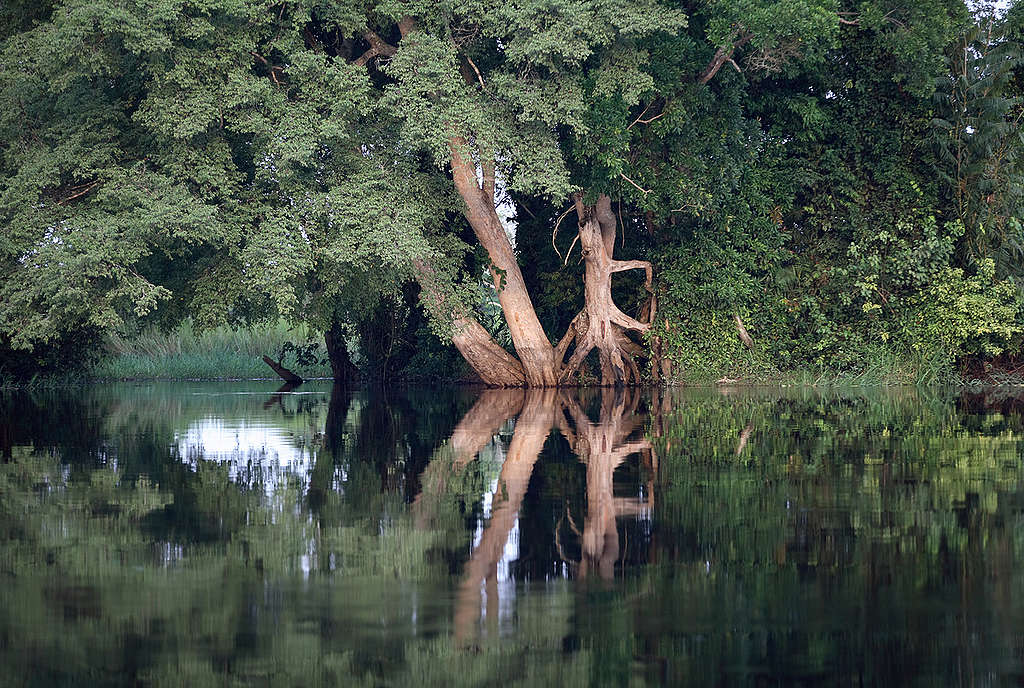
In the case of the oil and gas auction in the Democratic Republic of Congo, given the likely scale and intensity of these activities, it is reasonable to expect that this auction will have significant impacts on local ecosystems and wildlife populations.
Oil and gas exploration and production often involve extensive infrastructure development, including drilling wells, building access roads, and constructing pipelines. To do all this, the land must be cleared. These activities can lead to habitat fragmentation, which refers to the division of continuous habitats into smaller, isolated patches.
In addition to the direct impact on wildlife, habitat fragmentation can also have indirect impacts on human populations, as it can lead to increased human-wildlife conflict, reduced ecosystem services, and reduced recreational opportunities.
Habitat fragmentation of the peatlands and forests will also have a range of ecological impacts, including the loss of biodiversity, changes in species composition, and increased vulnerability to invasive species. It will also impact ecosystem processes, such as nutrient cycling and water filtration, which can have far-reaching consequences for the health and well-being of both human and non-human populations.
Less rain, more drought, worsening climate crisis
The Congo rainforest is responsible for 50% of the rainfall in Sub-Saharan Africa.
The basin plays a vital role in the hydrological cycle that drives some of the rainfall patterns in the Sahel and the Horn of Africa.
As droughts grow more frequent and intense in both regions—bringing heightened competition for water resources—the importance of protecting the forest only grows to be more urgent.
Water pollution
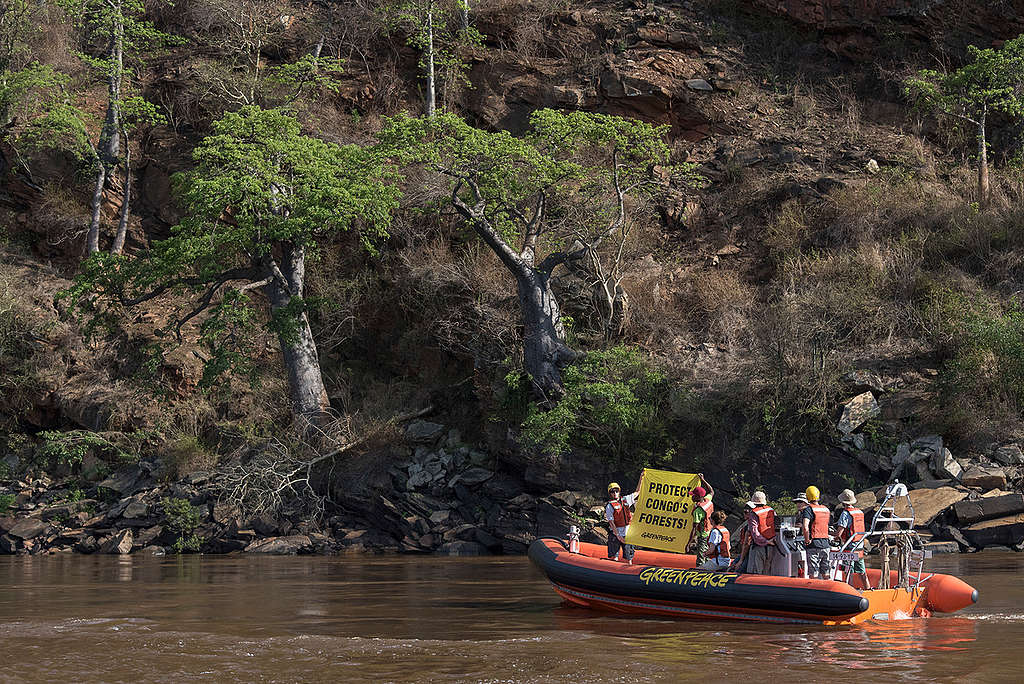
Oil and gas drilling processes pose significant threats to water resources. In the Congo Cuvelleate majority of the communities that live there are dependent on lakes, major rivers, smaller ones as well as streams and rivers.
The forest and the rivers are the only source of income and people’s livelihood. Agriculture, fishing, trapping and hunting are the main subsistence activities.
Furthermore, the communities living in the do are not supplied with drinking water infrastructure. There is a Total absence of water treatment facilities making it that The sources of drinking water and water for cooking and bathing remain, for the most part, rivers, streams or unmaintained water points.
Therefore, any pollution of a river will affect the lives of thousands of populations in the areas concerned.
To make matters worse, Most villages are inaccessible and lack decent road infrastructure. The medical infrastructure is also very rudimentary and could in no way support cases of water-borne diseases, which can be expected in cases of water pollution.
Furthermore, oil and gas drilling can also cause water pollution through the disposal of drilling waste. The waste produced during drilling contains chemicals, heavy metals, and other pollutants that can contaminate groundwater and surface water.
If this waste is not disposed of properly, it can seep into nearby water sources and contaminate them, leading to severe health risks for both humans and animals. Any oil spill could become a life-threatening calamity, poisoning local communities’ only water resources.
Increase in deforestation:
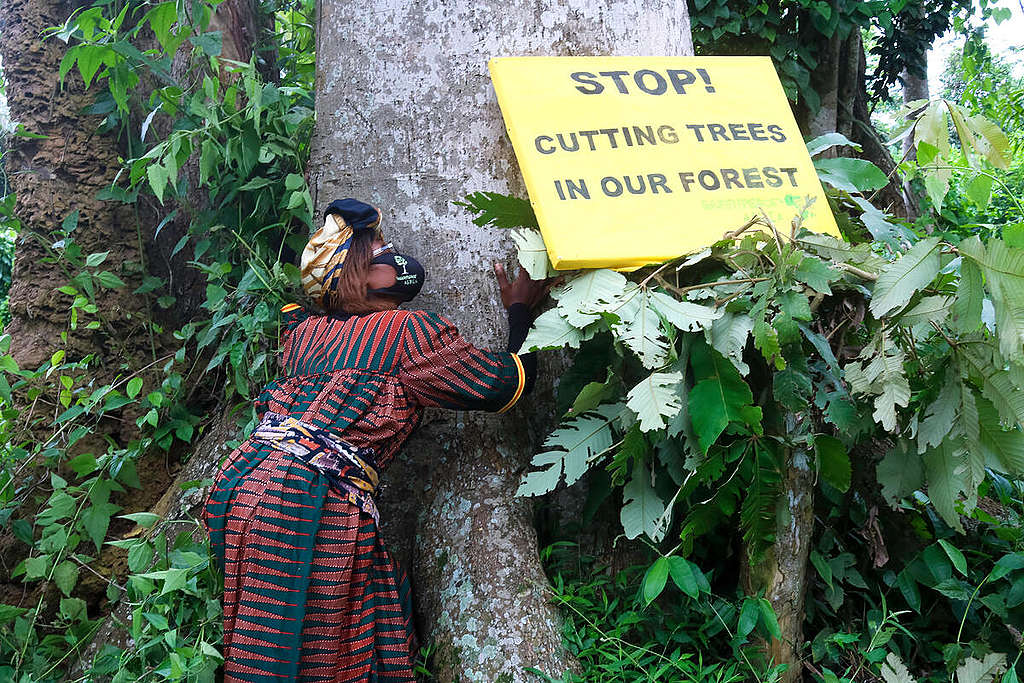
The cutting of access tracks for oil exploration would lead to greater hunting pressure in previously inaccessible swamp forests. Degraded forests would then be liable to fires and targeted by loggers for wood and charcoal production.
Whether the oil is found or not It remains to be seen whether any actual extraction will result; still, merely establishing infrastructure for oil and gas exploration will make it easier for loggers to continue deforesting the Congo Basin. The DRC has lost upward of 1.2 million hectares (roughly 4,600 square miles) of tree cover each year for the last five years, according to Global Forest Watch.
Endangered wildlife: poaching is already an issue
The development of infrastructure to support oil exploration will open up the forest to the dangers of poaching. This is because previously inaccessible areas cut off from humanity will now be accessible to poachers.
Endangered livelihood
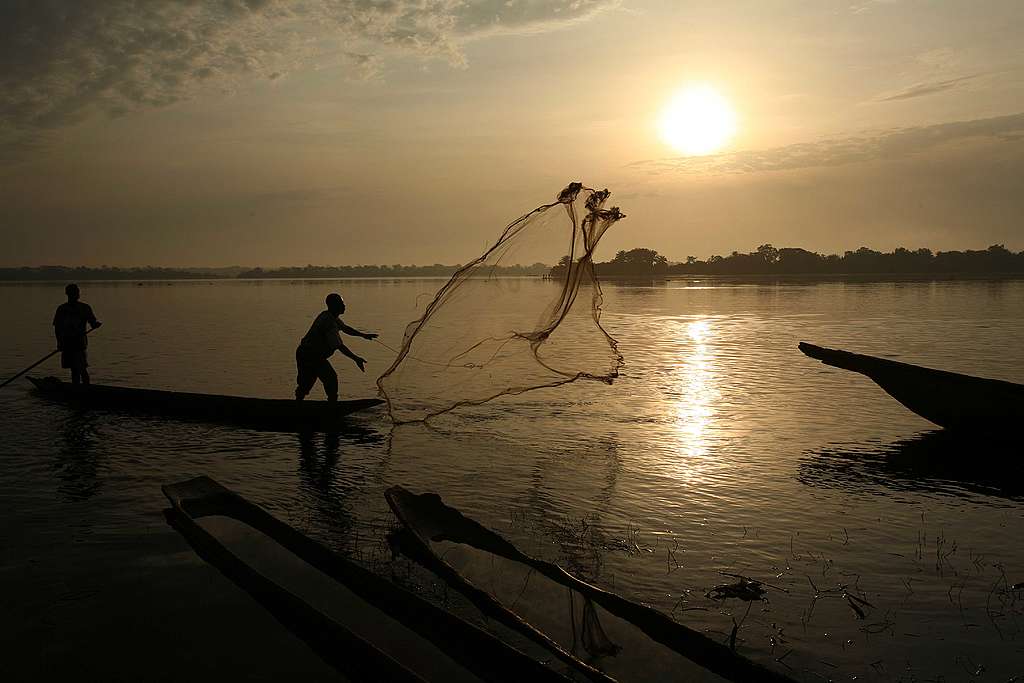
A major source of income in the Congolese cuvette: is fishing. There exist about 21 fishing villages along Lake Upemba in the periphery of Upemba National Park that will be affected by the oil blocks being auctioned. at least 150,000 fishermen could lose their only source of income as fishing is a principal source of cash income for rural households. Fish are sold in both village and urban markets and fishing activities support the employment, directly or indirectly, of many people, including fishermen, traders, vendors, or owners who rent engine canoes.
People don’t believe the advent of oil will bring development and believe that any potential employment would resemble the miserable jobs in the timber industry.
What is the DRC’s track record in dealing with the international exploitation of resources?
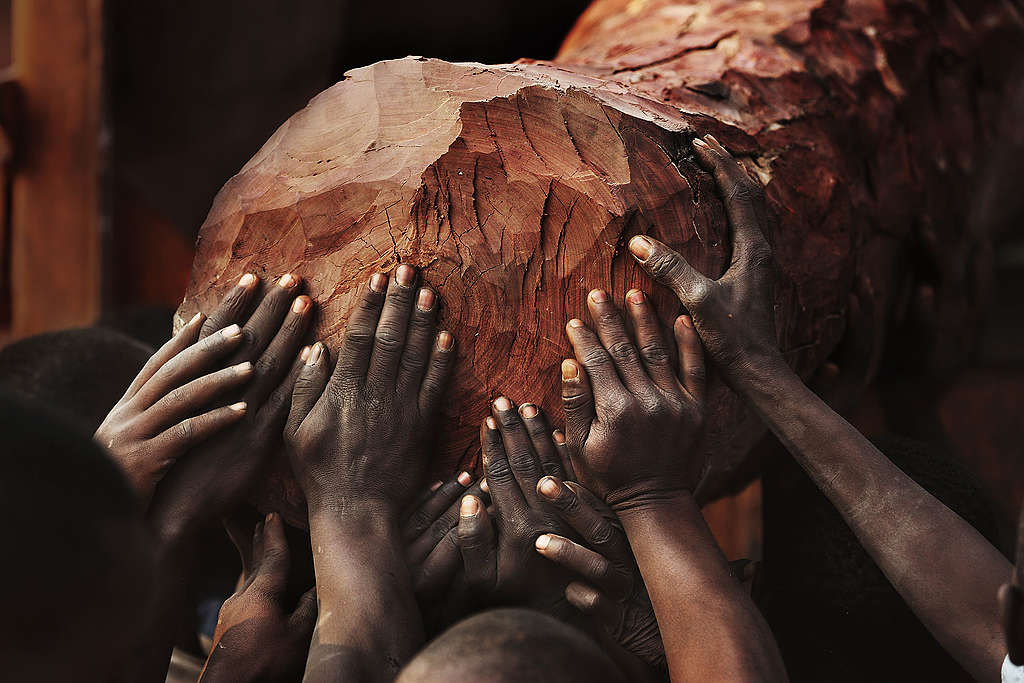
Congo is already a mining powerhouse, producing large amounts of copper, cobalt, gold, and diamonds, yet it remains deeply impoverished, due largely to corruption and misgovernance.
According to World Bank figures some three-quarters of the population lives on less than $1.90 a day
These oil and gas blocks were sold to the highest bidder in what the country’s government has framed as a major way to advance its economy. With nationalist rhetoric, the DRC government constantly reiterates that its duty is to its people and not the environment.
A misleading message as the government which claims to have a duty to its people first did not consult with those living in this land, their ancestral land, the land in which they get their food and livelihood from before the auction.
On occasion, Congolese environment minister Eve Bazaiba asked if the government should let children die rather than profit from its fossil resources.
This might seem like a concern for its people but these words sadly remain to be acted on. The government has a track record of doing very little for its people: in the Congo basin where oil and gas blocks are being auctioned there is an immense level of energy poverty and impoverished communities.
Congo’s natural resources and the labor of its people have been exploited for centuries.
And for well over two decades now, residents in eastern Congo have endured insecurity fueled in part by foreign-backed armed groups competing for access to resources.
Increased suffering of its people is what this exploration will cause.
All in all, not all hope is lost,
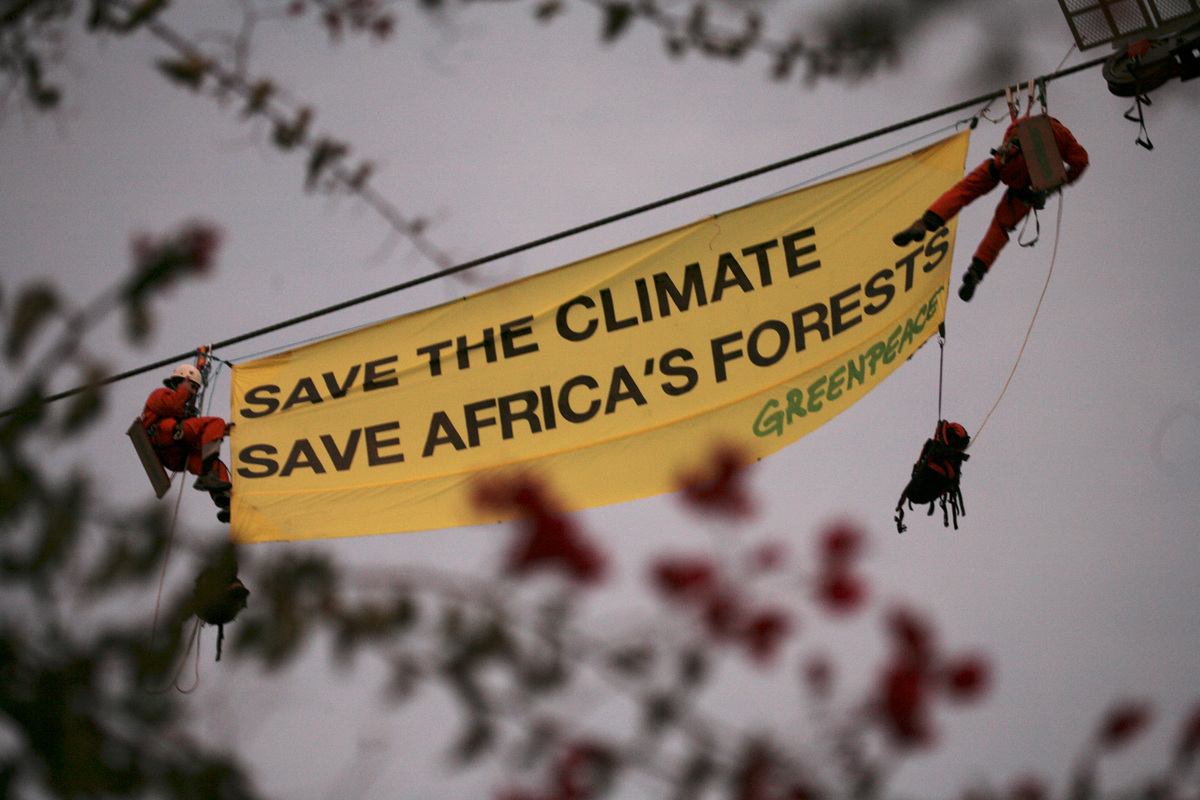
At Greenpeace Africa, we continue to work to protect the dignity of the people of the Congo and the land on which they live. We’re in a fight with the government and oil companies: two powerful entities. We need your help to combat these forces.
So far we have:
- Conducted two field missions to dozens of communities in four prospective oil blocks covering about 100,000 square kilometres in the Congo peatlands, and released this report documenting the lives of those living in the auctioned land. The report is a first effort to present the view of some of the local communities likely to suffer the most direct consequences of potential oil exploration and subsequent drilling.
- Organized various activist actions to bring awareness to the fact that the Congo Basin is in danger from fossil fuel giants.
- Collected over 100,000 signatures on this petition and presented them to the DRC government. Even though this has led to condemnation from government officials, we are working towards the common good of the Congolese and so we must keep at it. On July 26, 2022, the Minister of Hydrocarbons, Didier Budimbu, called the campaign of Greenpeace Africa “sabotage” of the government’s efforts by mentioning that the petition of Greenpeace Africa with other NGOs both national and international was not important, and yet these NGOs and ourselves campaign above all for the good of local communities and are managed by Congolese.
- Over the past year, we have continued to fight so that there is no development of new oil fields in Africa’s largest forest. Even though we sometimes face threats to our lives we continue to do activism in conjunction with the people of the Congo in order to preserve their livelihoods, their resources, their homes and their dignity.
We do not support the pouting out of the licensing rights for 30 oil and gas blocks up for auction and call for the immediate cancellation of the oil and gas auction. No new oil and gas in DRC.
We believe that the Congolese government’s plan to go ahead with this land auction will have catastrophic consequences for communities, biodiversity and the global climate.
To continue this work that will help stop the displacement of millions of Congolese who depend on this land we call on you to make a donation. Your contribution will help us keep at this work and most importantly support the Congolese on the ground to resist the forces from the government and big oil to rob them of their ancestral land.

Discussion
are right, logging must stop. The Vegetation mitigates floods by absorbing water vapour. The Amazone in Brasil is also one of the Lungs of the world like the congo river. We need a global Rainforest initiative.